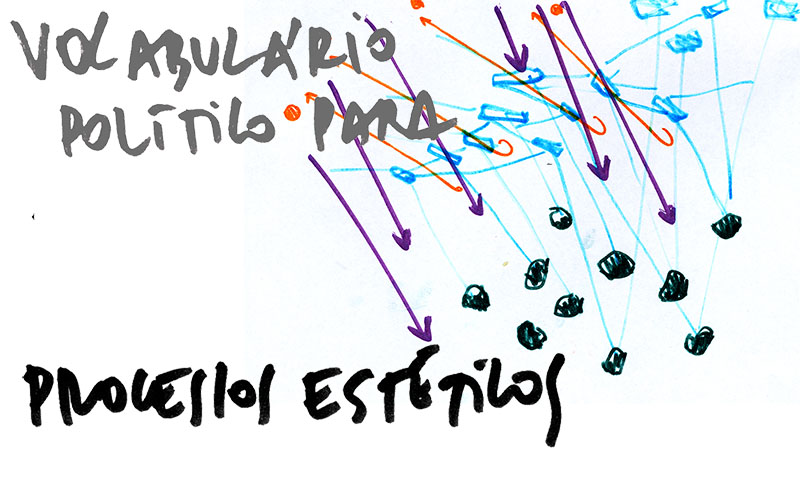/ To be read out loud
Short editorial (1)
How to talk about the aesthetic processes that are transformative in our crossings with politics?
Why do our vocabularies intersect all the time?
The Political Vocabulary is a project that aims to open a space about these questions. It aims to create space to think about the crossings and intersections in the vocabularies that we build within our social, artistic and political practices. The Political Vocabulary aims to open a space to talk from what we do and to talk from what we desire to do. To talk about how we create in the arts and how we create in politics: not politics as the inaccessible space of power, but the politics from our individuated lives and our collectivities, towards a politics of the common. The “aesthetic” here is proposed as a way to access the transformational processes we experience in the sensible, from what we experience, perceive and express. The sensible is not enclosed when the processes of politics are open in our bodies. The political in the vocabulary is, then, the space of implosion of two formalizations: the first one, individuality itself (talking alone or to your self, and authorship), and the second, the idea that politics is a space we can only access with specific vocabularies or with political forms that are already known. In order to open this space of implosion talking in excess is productive, talking in excess and listening, of course. It is productive also to be open to the streets, the encounters, the assemblies, and to the moments that disorient us in the arts, in politics, in work and in intimate life. To encounter the space of the vocabulary is to open a space for listening, for the availability of talking about other subjects, taking other approaches, performing other points of view and creating other perspectives.
But politics as a space for transformation is also a space for the encounter, for identification, for tuning, for rhythmanalisations. (2) From the desire to make intersections in our vocabularies and encounter those who take part in this conversation. From the passage from one space to the other – from the project that happened in Rio to you talker-reader and your vocabularies. The Political Vocabulary passes the riddle of the writing as a space of experimentation of other spaces for talking, of other tactics and intervention in our own vocabularies. The writing has the challenge of being crossed by alive bodies, in movements of composition. The vocabulary of writings that emerged wishes to participate in a loud voice reading of a loose conversation that encounters the space of unpredictable thinking, that passes eventually beyond the configuration of words that already signify our practices, in order to produce new rhythms, and to compose new collectivities, enabling other senses in process, in processing.
The vocabulary in its written form, organised in “entrances” passed by the moorings of the writing, of the intrinsic and sometimes hard exercise of the concepts and discourses, that might relapse to more formalising aesthetics, those that are somehow close to the encyclopedias and dictionaries. We access these formalisations to retake with them the space of the speech and of creativity. The space that this Vocabulary wants to provoke is, hence, the space of a vocabulação (vocabulation) (3). A vocabulação in a loud voice as part of an analytical process – to listen to your self and to the other, and to others – and realise how we speak, with whom we speak. That’s why the proposition I or we bring to you talker-reader is “to be read out loud”, as a way of opening together the space for the politicisation of our vocabularies, for a new composition, and a space for experimentation that becomes aesthetic.
The Vocabulary, then, becomes a vocabulinary, a space for language’s promiscuity, for creativity and politics. This is a space for the rubbing of each of our ways of talking with each other, with others, and within one self. From the idea that the work occupies the body – or is it the body that occupies itself with the words – comes the perception of a plural body, that comes into a constitutive rhythmanalisation with our vital, existential, social, creative processes.
Cristina Ribas
October 2014
(1) This text is a short version of the Editorial. My translation.
(2) Rhythmanalisations is thought here with a reference to Henri Lefebvre, on how the rhythmanalist migh experience a way of listening to the world, that here I extend to a search for producing rhythm with each other through a collective listening. Henri Lefebvre, Éléments de rythmanalyse: Introduction à la connaissance des rythmes, Paris: Éditions Syllepse,1992. Two texts in the Political Vocabulary make reference to the rhythmanalist from Lefebvre, “Listening”, from Andre Mesquita, and “Speechless”, from Annick Kleizen.
(3)I suggest translating “vocabulação” (“vocabulary” plus “action” into vocabulation. “Vocabulação” or “Vocabulation” is a term created to consider the process of working on our vocabularies; a noun made verb. We have created another one during the encounter in Rio de Janeiro, a suggestion made by Cecilia Cotrim, resulting from the merging of “vocabulary” with “bolinação” (to incite someone sexually, or to annoy someone by making jokes) to create the expression (to) “vocabulinar”.
(for the complete text in portuguese click here)


